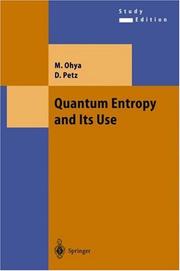| Listing 1 - 4 of 4 |
Sort by
|

ISBN: 3540208062 Year: 2004 Publisher: Berlin ; New York : Springer,
Abstract | Keywords | Export | Availability | Bookmark
 Loading...
Loading...Choose an application
- Reference Manager
- EndNote
- RefWorks (Direct export to RefWorks)
Book
Year: 2012 Publisher: Berlin : Walter de Gruyter GmbH & Co. KG,
Abstract | Keywords | Export | Availability | Bookmark
 Loading...
Loading...Choose an application
- Reference Manager
- EndNote
- RefWorks (Direct export to RefWorks)
The main emphasis of this work is the mathematical theory of quantum channels and their entropic and information characteristics. Quantum information theory is one of the key research areas, since it leads the way to vastly increased computing speeds by using quantum systems to store and process information. Quantum cryptography allows for secure communication of classified information. Research in the field of quantum informatics, including quantum information theory, is in progress in leading scientific centers throughout the world. The past years were marked with impressive progress made by several researchers in solution of some difficult problems, in particular, the additivity of the entropy characteristics of quantum channels. This suggests a need for a book that not only introduces the basic concepts of quantum information theory, but also presents in detail some of the latest achievements.
Information theory in physics. --- Quantum entropy. --- Quantum Computing. --- Quantum Cryptography. --- Quantum Information. --- Quantum Systems. --- Quantum Theory.

ISBN: 1281934372 9786611934378 9812794204 9789812794208 9789812794192 9812794190 Year: 2008 Publisher: New Jersey World Scientific
Abstract | Keywords | Export | Availability | Bookmark
 Loading...
Loading...Choose an application
- Reference Manager
- EndNote
- RefWorks (Direct export to RefWorks)
This volume is a collection of articles written by Professor M Ohya over the past three decades in the areas of quantum teleportation, quantum information theory, quantum computer, etc. By compiling Ohya's important works in these areas, the book serves as a useful reference for researchers who are working in these fields. Sample Chapter(s)
Introduction (109 KB)
Chapter 1: Adaptive Dynamics and Its Applications To Chaos and Npc Problem (1,633 KB)
Contents:
- Adaptive Dynamics and Its Applications
- A Stochastic Limit Approach to the SAT Problem
Quantum entropy. --- Quantum teleportation. --- Quantum theory. --- Teleportation, Quantum --- Quantum theory --- Quantum dynamics --- Quantum mechanics --- Quantum physics --- Physics --- Mechanics --- Thermodynamics --- Entropy --- Statistical physics
Book
ISBN: 1402093055 9786612127250 128212725X 1402093063 Year: 2009 Publisher: [Dordrecht] : Springer Science,
Abstract | Keywords | Export | Availability | Bookmark
 Loading...
Loading...Choose an application
- Reference Manager
- EndNote
- RefWorks (Direct export to RefWorks)
The leading theme of the book is complexity in quantum dynamics. This issue is addressed by comparison with the classical ergodic, information and algorithmic complexity theories. Of particular importance is the notion of Kolmogorov-Sinai dynamical entropy and of its inequivalent quantum extensions formulated by Connes, Narnhofer and Thirring on one hand and Alicki and Fannes on the other. Their connections with extensions to quantum systems of Kolmogorov-Chaitin-Solomonoff algorithmic complexity theory is also presented. The technical tools employed are those of the algebraic approach to quantum statistical mechanics which offers a unifying view of classical and quantum dynamical systems. Proofs and examples are provided in order to make the presentation self consistent.
Computational complexity. --- Differentiable dynamical systems. --- Kolmogorov complexity. --- Quantum entropy. --- Quantum theory. --- Quantum theory --- Kolmogorov complexity --- Quantum entropy --- Differentiable dynamical systems --- Computational complexity --- Physics --- Physical Sciences & Mathematics --- Atomic Physics --- Complexity, Computational --- Quantum dynamics --- Quantum mechanics --- Quantum physics --- Physics. --- Dynamics. --- Ergodic theory. --- Quantum physics. --- Quantum computers. --- Spintronics. --- Statistical physics. --- Dynamical systems. --- Quantum Information Technology, Spintronics. --- Dynamical Systems and Ergodic Theory. --- Quantum Physics. --- Mathematical Methods in Physics. --- Statistical Physics, Dynamical Systems and Complexity. --- Mathematical statistics --- Dynamical systems --- Kinetics --- Mathematics --- Mechanics, Analytic --- Force and energy --- Mechanics --- Statics --- Magnetoelectronics --- Spin electronics --- Microelectronics --- Nanotechnology --- Computers --- Thermodynamics --- Ergodic transformations --- Continuous groups --- Mathematical physics --- Measure theory --- Transformations (Mathematics) --- Natural philosophy --- Philosophy, Natural --- Physical sciences --- Dynamics --- Statistical methods --- Electronic data processing --- Machine theory
| Listing 1 - 4 of 4 |
Sort by
|

 Search
Search Feedback
Feedback About UniCat
About UniCat  Help
Help News
News